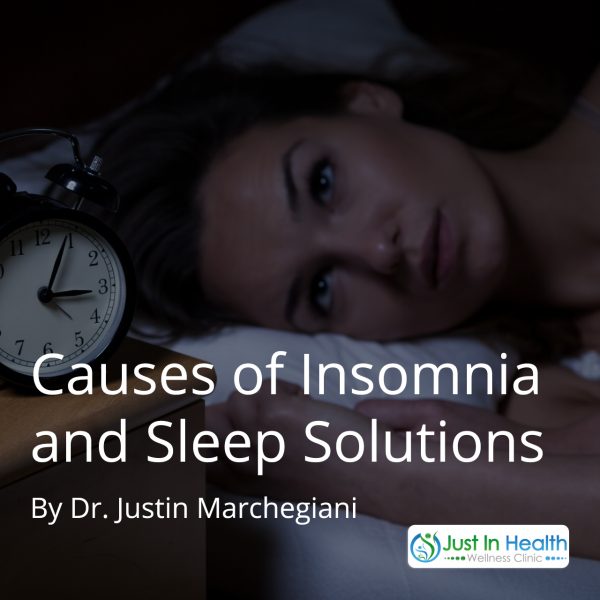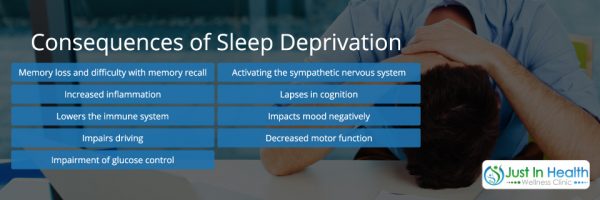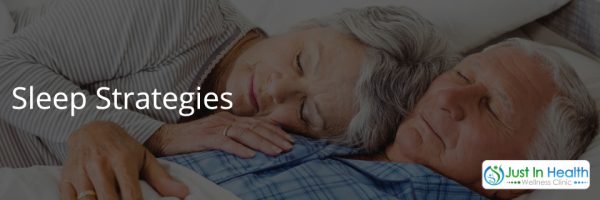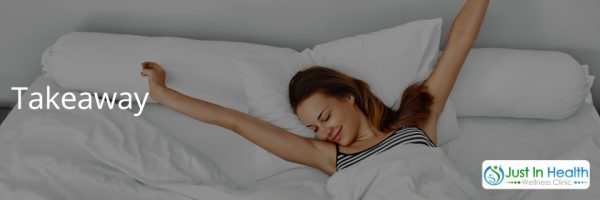Causes of Insomnia and Sleep Solutions

By Dr. Justin Marchegiani
Around half of the population reports difficulty falling asleep. 1 in 3 adults will suffer from insomnia at some point in their life, and only 31% of high school students report getting a full 8 hours of sleep on an average school night. We are living in a time of more sleep disorders and accidents caused by tiredness than any other point in history, today we are going to explore some of the reasons why our nation has trouble sleeping, and what we can do to reverse this growing epidemic.

THE “WHYs” BEHIND OUR SLEEPLESSNESS
There are many factors responsible for the sleep issues many of us face. Certain medications come with side effects that make it hard to sleep, as can regularly drinking caffeine later in the day. Interestingly, both eating too late and not eating enough at night can both cause trouble sleeping. Exercise, video games, and even reading lively books raise your heart rate and can make it hard to wind down at night. However, stress is one of the largest causes of sleep trouble. Worrying about commitments, scheduling, places to be and things to do all have a serious effect on sleep.

CONSEQUENCES OF SLEEP DEPRIVATION
Chronic sleep deprivation is so common in our modern day and age that they symptoms often go unnoticed, or have been normalized. However, there are several adverse effects that go much further that just ‘feeling tired.’
Click here if you are having trouble sleeping for help from a functional medicine doctor!
Sleep loss has been shown to affect a variety of neurocognitive, psychological, and physical functions, including:
- Memory loss and difficulty with memory recall
- Increased inflammation
- Lowers the immune system
- Impairs driving
- Impairment of glucose control
- Activating the sympathetic nervous system (which decreases the movement of the large intestine, causes sweating, weakens digestive ability, raises blood pressure, and activates the fight-or-flight response!)
- Lapses in cognition
- Impacts mood negatively
- Decreased motor function

SLEEP STRATEGIES
Have you heard of “sleep hygiene”? Sleep hygiene is comprised of several strategies that, when implemented into your bedtime routine, set the stage for a great night's sleep:
- Avoid consuming alcohol, coffee, caffeinated tea, and other stimulants at least 4-6 hours before bedtime. Ideally, limit these beverages to a 12 pm cutoff time, as caffeine can stay in your body for up to 12 hours!
- Use blackout curtains and cover up any sources of light. This means no light-up clocks and taping over any lights that might blink during the night.
- Keep the bedroom cool: your temperature drops a few degrees during the night. Having a cool bedroom, the mid 60s is an ideal temperature range, will help you wind down.
- Avoid working out before bed: while exercising during the day will help you get great sleep that night, working out in the evenings will cause an endorphin boost that makes it hard to fall asleep.
- Avoid blue light at night: Blue light emitted from most light bulbs, tablets, phones, TVs, computers, and other electronics signals to your brain that it’s time to be alert. Think about it: the sun gives off light in the cool spectrum during the day, and the sunset is warm. So are fires, which is the only source of light our ancestors would have seen after sunset! If you have to look at a screen at night, there are applications that limit the blue spectrum your device emits, and there are also blue-blocking glasses you can wear for even more protection!

SUPPLEMENTS FOR SLEEP
- GABA: This amino acid calms your brain activity, which leads to full body and mind calmness. It reduces anxiety and helps relax your body for sleep.
- Tryptophan: Another amino acid, tryptophan is useful in treating anxiety, depression, and sleep disorders.
- Melatonin: Melatonin is a hormone that your body produces when it’s time for bed, so it shouldn’t be used on a nightly basis. However, if you’re trying to retrain your sleep cycle (whether it be because of a move to a different time zone, or starting a new job that requires you to go to bed earlier), melatonin can be very useful.
- Magnesium: Magnesium is actually responsible for regulating GABA and melatonin levels. Taking magnesium can help your body regulate its sleep-wake cycle. It’s also a muscle relaxer, meaning it helps both your mind and your body to relax.
- Holy basil: This adaptogen, also known as tulsi, reduces stress and helps you wind down.
- Lavender: Used in a tea or as an essential oil diffused into your bedroom, lavender is a calming herb that sets the stage for sleep.

TAKEAWAY
Sleep hygiene is just as important as other forms of hygiene, such as brushing your teeth and taking showers. Getting enough sleep ensures you are ready to tackle everything the next day has in store and makes you healthier! If you are still having trouble falling asleep, there are a variety of natural supplements to help you wind down.
Click here for a functional medicine consult and start feeling better today!
References
https://www.cdc.gov/features/dssleep/index.html
http://www.sleepmedsite.com/page/sb/sleep_disorders/sleep_statistics
https://www.ncbi.nlm.nih.gov/pubmed/15133379
https://www.ncbi.nlm.nih.gov/pubmed/15798944
https://www.ncbi.nlm.nih.gov/pubmed/26005400






